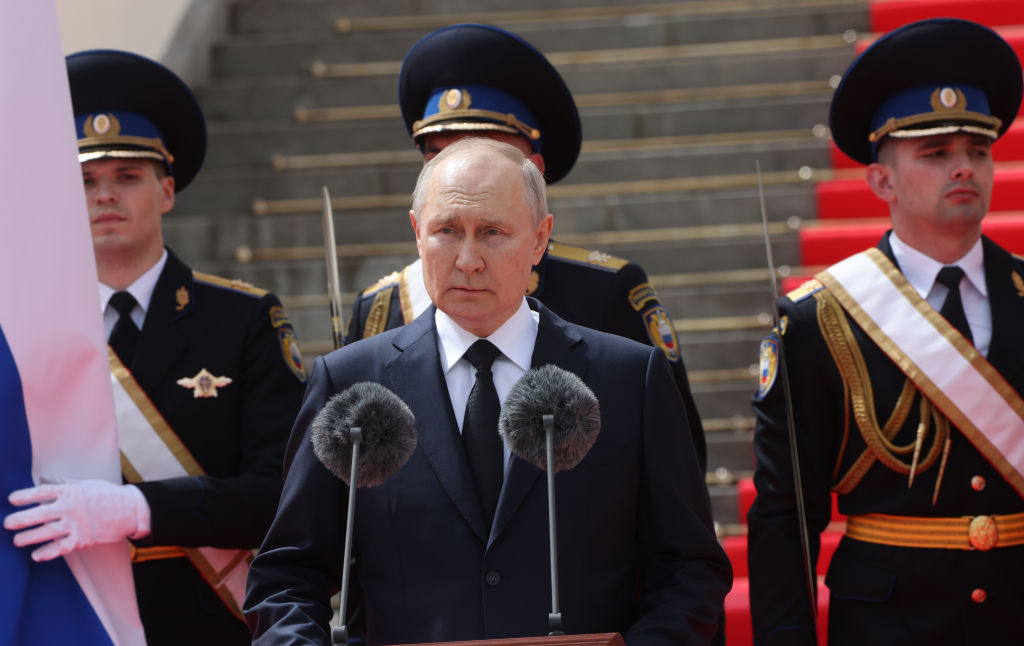The spectacle of a brief, bizarre mutiny in Russia is over. Yet its ramifications for Vladimir Putin’s reign remain unclear, and the U.S. should be doing everything possible to exploit the Russian military’s disorder to benefit Ukraine.
Over the weekend, Yevgeny Prigozhin, the chief of the mercenary Wagner Group, led thousands of his troops as they took control of a strategic Russian city and came within 120 miles of Moscow. He called off the rebellion after brokering a deal through Belarussian strongman Alexander Lukashenko. But Prigozhin’s statements undermining the Russian military leadership in general—and Defense Minister Sergei Shoigu and Chief of the General Staff Valery Gerasimov in particular—remain for all to see.
“The Armed Forces of Ukraine were not going to attack Russia with the NATO bloc. The Russian Defense Ministry is deceiving the public and the president,” Prigozhin said, undermining the official basis for Putin’s war ahead of the rebellion. He also warned of punishment for those responsible for the deaths of tens of thousands of Russian men in Ukraine. While much remains unknown, that shouldn’t stop the U.S. and its allies from amplifying Prigozhin’s statements so that they reverberate in every Russian household.
The Wagner rebellion highlights how Putin has been grossly flippant with the lives of Russians—tens of thousands of Russians have died on the battlefield in the past 16 months—and the Russian people have noticed. When Wagner rolled through Russian streets, the people were supportive. Clearly there is a sizable chunk of the Russian population that understands the war isn’t going Russia’s way and sympathizes with Prigozhin’s criticism of the military brass.
The more the Kremlin feels domestic opposition to Russia’s war against Ukraine, the better, and there is much more Washington can do on that front. But most important is bolstering Ukrainian forces on the battlefield itself, and President Biden’s risk aversion and unwillingness to think clearly about the strategic aims of the United States and NATO for the outcome of the Ukraine war continues to be a problem.
Biden apologists will point to the billions of dollars the U.S. has poured into Ukraine’s defense, but that misses the most important point. Biden remains unwilling to permit deliveries of categories of weapons Ukraine could use to finally score battlefield wins over Russia. And when allies want to deliver more capable weapons to Ukraine, the U.S. harms Ukraine and itself when it uses export controls as a pretext to stop them.
The U.S. can make a material difference on the battlefield by providing (or allowing allies to provide) several different weapons platforms, including ATACMs, bigger more powerful drones like the MQ-9 Reaper, and without a doubt the DPICM cluster munitions, which would greatly enable Ukraine to make up for Russia’s numerical advantage in soldiers and artillery rounds.
Ukraine wants these categories of weapons to win, but the Biden administration is following a familiar pattern as they did with other systems. First, they decline to provide them. Eventually, under pressure by Kyiv, allies and Congress, the administration relents. Precious time and Ukrainian lives are lost in the meantime. But this time can be different: It is an opportunity to rush greater capabilities to Ukraine so that it can exploit the Russian disorder and pressure Putin to contrive an offramp.
Perhaps the most shocking part of the short-lived mutiny was how easy it was for Prigozhin’s forces to move through Russian territory. That does not bode well for the Russian state security apparatus. But whatever happens internally, now is not the time for the West to hit the brakes. Let’s hit the gas.






Please note that we at The Dispatch hold ourselves, our work, and our commenters to a higher standard than other places on the internet. We welcome comments that foster genuine debate or discussion—including comments critical of us or our work—but responses that include ad hominem attacks on fellow Dispatch members or are intended to stoke fear and anger may be moderated.
With your membership, you only have the ability to comment on The Morning Dispatch articles. Consider upgrading to join the conversation everywhere.